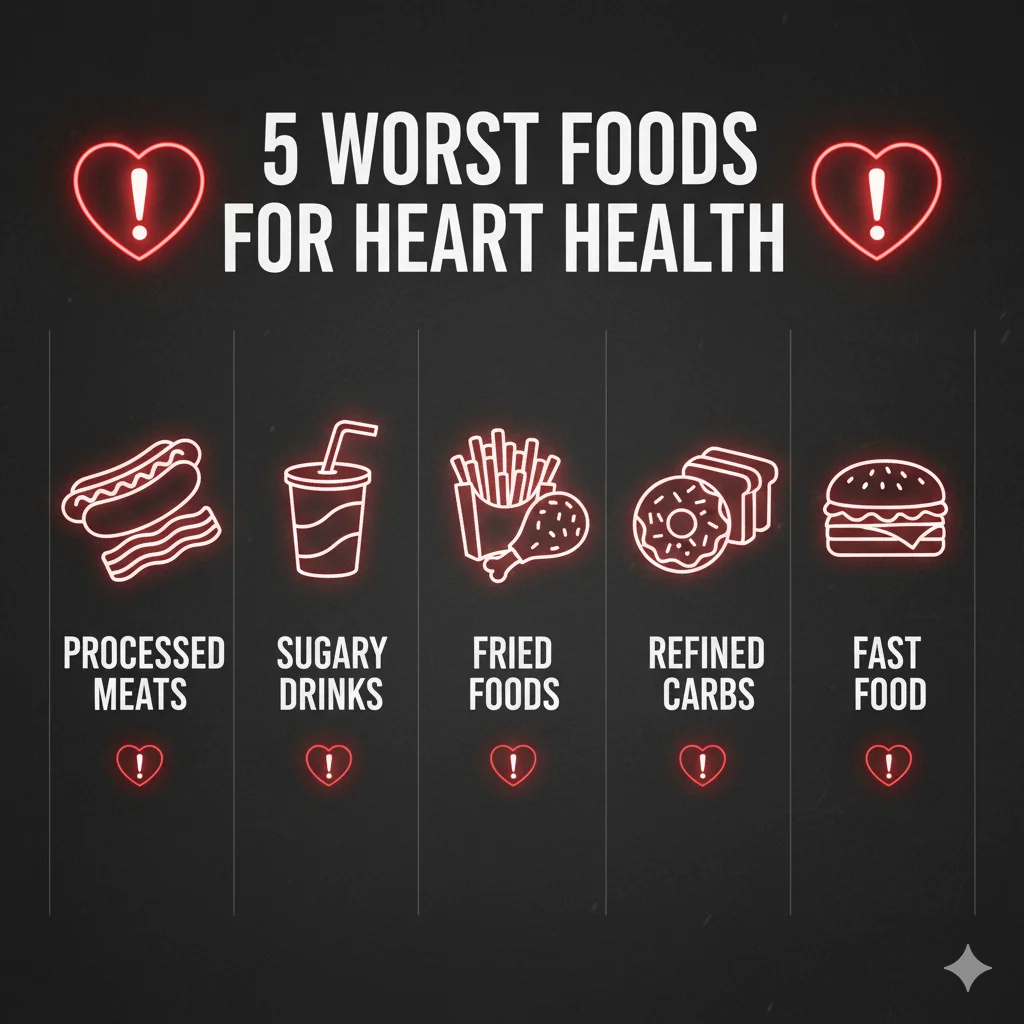Heart disease remains the leading cause of death in America, claiming over 700,000 lives annually. Yet many Americans unknowingly consume the worst foods for heart health every single day, believing they’re making harmless or even healthy choices. Recent studies from Harvard and the American Heart Association reveal that more than half of what Americans eat on average is ultra-processed, directly contributing to cardiovascular disease.
If you’re concerned about your heart health or want to prevent cardiovascular problems before they start, understanding which foods to avoid is crucial. This comprehensive guide reveals the five worst foods for heart health that millions of Americans consume daily, often without realizing the long-term consequences.
Table of Contents
- Why These Foods Are So Dangerous
- The 5 Worst Foods for Heart Health
- The Science Behind Heart-Damaging Foods
- Healthier Alternatives
- Natural Heart-Healing Solutions
- Taking Action for Better Heart Health
Why These Foods Are So Dangerous for Your Heart {#why-dangerous}
The worst foods for heart health don’t just affect your waistline – they actively damage your cardiovascular system through multiple mechanisms:
Inflammation Triggers: These foods promote chronic inflammation throughout your body, particularly in your blood vessels. This inflammation damages artery walls and creates conditions perfect for plaque buildup.
Blood Pressure Elevation: Many heart-damaging foods are loaded with sodium and unhealthy fats that directly increase blood pressure, forcing your heart to work harder with every beat.
Cholesterol Imbalance: The worst foods for heart health typically raise LDL (bad) cholesterol while lowering HDL (good) cholesterol, creating an optimal environment for arterial blockages.
Insulin Resistance: Ultra-processed foods high in added sugars and refined carbohydrates can lead to insulin resistance, which directly impacts heart health and increases diabetes risk.
According to recent research from the NIH, up to 70% of the U.S. diet is composed of foods that are ultra-processed, making this a national health crisis that affects nearly every American household.
The 5 Worst Foods for Heart Health That Americans Eat Daily {#five-worst-foods}
1. Refined Seed Oils: The Hidden Heart Killer
Topping our list of the worst foods for heart health are refined seed oils – perhaps the most damaging yet widely accepted foods in American kitchens. These oils, including vegetable oil, canola oil, soybean oil, and sunflower oil, are found in virtually every processed food and restaurant meal.
Why They’re Dangerous:
- Extreme Processing: These oils undergo industrial processing involving high heat, chemical solvents, and multiple refinement stages that strip away all nutrients.
- Omega-6 Overload: They contain excessive amounts of omega-6 fatty acids, creating inflammation when consumed regularly.
- Oxidation: The processing creates oxidized fats that directly damage blood vessel walls.
Where You’ll Find Them:
- Salad dressings and mayonnaise
- Fried foods from restaurants
- Packaged snacks and crackers
- Baked goods and pastries
- Most processed foods
The Impact: A 45-year-old patient I know about was a non-smoker who exercised regularly and had normal cholesterol levels. However, his angiography revealed 60% arterial blockage. His primary dietary mistake? Using refined sunflower oil daily, believing it was heart-healthy.
Better Alternatives: Cold-pressed olive oil, avocado oil, or small amounts of grass-fed butter or coconut oil.
2. Ultra-Processed Bakery Items and Refined Flour Products
The second category of worst foods for heart health includes the bakery items and refined flour products that have become staples in American diets. From morning muffins to evening cookies, these foods are consumed without a second thought.
The Problem with Refined Flour:
- Blood Sugar Spikes: Refined flour acts like sugar in your bloodstream, causing rapid glucose spikes
- Trans Fats: Many bakery items contain trans fats, which are associated with high cholesterol and high blood pressure, factors that contribute to heart disease
- Added Sugars: Most contain excessive added sugars that promote insulin resistance
- Nutrient Void: They provide calories without essential nutrients
Common Sources:
- White bread and sandwich rolls
- Cookies, cakes, and pastries
- Crackers and snack foods
- Pizza dough and burger buns
- Breakfast cereals (many varieties)
Harvard Research Shows: Studies indicate that consuming refined flour products regularly can increase triglycerides, a major marker for heart attack risk. The combination of refined carbohydrates and added sugars creates a perfect storm for cardiovascular damage.
Heart-Healthy Swaps: Choose whole grain options, almond flour baked goods, or better yet, whole foods like nuts, seeds, and fresh fruit for snacking.

3. Processed and Deli Meats: Convenience at a Deadly Cost
Processed meats rank among the absolute worst foods for heart health, yet they’re incredibly convenient and popular among busy Americans. These include deli meats, sausages, hot dogs, bacon, and pre-cooked chicken products.
Why They’re Heart Killers:
- Nitrates and Nitrites: Chemical preservatives that can form harmful compounds in your body
- Excessive Sodium: Often containing 3-4 times more sodium than fresh meats
- Saturated Fats: High levels of harmful saturated fats
- Advanced Glycation End Products (AGEs): Formed during processing and linked to arterial damage
Research Findings: A 2024 study of more than 200,000 adults tied eating ultra-processed foods—particularly sugary drinks and processed meats—to an increased risk for heart disease.
The Shelf-Life Test: Here’s a revealing experiment – leave a piece of fresh meat and a piece of processed meat (like a hot dog) outside. The fresh meat spoils in 1-2 days, while the processed meat remains unchanged. If bacteria won’t eat it, should you?
Better Protein Sources:
- Fresh, lean meats (chicken breast, fish, lean beef)
- Plant-based proteins (legumes, quinoa, hemp seeds)
- Eggs from pasture-raised chickens
- Wild-caught fish and seafood
4. Sugar-Sweetened Beverages: Liquid Heart Damage
Among the worst foods for heart health, sugar-sweetened beverages deserve special attention because they deliver concentrated damage in liquid form. This category includes sodas, energy drinks, sports drinks, flavored waters, and even many fruit juices.
The Liquid Sugar Problem:
- Rapid Absorption: Liquid sugars enter your bloodstream faster than solid sugars
- No Satiety: They don’t make you feel full, leading to overconsumption
- Insulin Spikes: Cause dramatic insulin responses that stress your cardiovascular system
- Liver Fat: Promote fatty liver disease, which is linked to heart problems
Shocking Statistics: A single 12-ounce can of cola contains 35-39 grams of sugar – equivalent to nearly 10 teaspoons of table sugar consumed in minutes.
Hidden Sources:
- “Healthy” fruit juices (even 100% juice)
- Flavored coffee drinks
- Sports and energy drinks
- Iced teas and lemonades
- Smoothie shop drinks with added sweeteners
The Heart Connection: Consuming high-sugar drinks frequently is associated with high cholesterol and high blood pressure, factors that contribute to heart disease.
Healthy Hydration: Water, unsweetened herbal teas, sparkling water with fresh fruit, and homemade vegetable juices without added sugars.
5. Deep-Fried Foods: The Ultimate Heart Health Destroyer
Rounding out our list of worst foods for heart health are deep-fried foods. From french fries to fried chicken, these foods combine multiple heart-damaging elements into one irresistible package.
The Triple Threat:
- Toxic Oil Absorption: Foods absorb large amounts of inflammatory oils during frying
- Advanced Glycation End Products: High-heat cooking creates harmful compounds
- Caloric Density: Extremely high in calories, promoting weight gain and metabolic dysfunction
Research Evidence: Fried fish consumption (>1 serving per week at baseline) was associated with a 48% higher risk of heart failure according to studies published in medical journals.
Common Fried Foods to Avoid:
- French fries and potato chips
- Fried chicken and fish
- Donuts and fried pastries
- Fried appetizers (mozzarella sticks, onion rings)
- Tempura and battered foods
Cooking Method Alternatives: Baking, grilling, steaming, air-frying with minimal oil, or sautéing in small amounts of healthy fats.

The Science Behind Heart-Damaging Foods {#the-science}
Understanding why these foods are the worst foods for heart health requires looking at the biological mechanisms they trigger:
Inflammation Cascade
When you consume ultra-processed foods, your body recognizes them as foreign substances, triggering an inflammatory response. Chronic inflammation damages the endothelium (inner lining of blood vessels), creating conditions for atherosclerosis.
Oxidative Stress
Many of the worst foods for heart health are high in oxidized fats and low in antioxidants. This creates oxidative stress, where harmful free radicals damage cells throughout your cardiovascular system.
Insulin Resistance Pathway
Foods high in refined sugars and processed carbohydrates cause repeated insulin spikes. Over time, your cells become resistant to insulin, leading to metabolic syndrome – a cluster of conditions that dramatically increase heart disease risk.
According to the American Heart Association, poor dietary choices are directly linked with increased cardiovascular disease risk, and adopting heart-healthy eating habits can significantly reduce that risk. For more in-depth insights, you can refer to this comprehensive resource from Harvard Health on diet and heart health which explains the scientific connection between food and cardiovascular wellness.
Endothelial Dysfunction
The worst foods for heart health directly impair your blood vessels’ ability to relax and contract properly. This dysfunction is one of the earliest signs of cardiovascular disease.
Healthier Alternatives to the Worst Foods for Heart Health {#healthier-alternatives}
Making the transition away from the worst foods for heart health doesn’t mean sacrificing flavor or convenience. Here are practical, delicious alternatives:
Instead of Refined Oils:
- Cold-pressed olive oil: Rich in heart-protective monounsaturated fats
- Avocado oil: High smoke point, perfect for cooking
- Coconut oil: Use sparingly for flavor
- Grass-fed butter: Better fatty acid profile than conventional butter
Instead of Refined Flour Products:
- Almond flour: High protein, low carb alternative
- Coconut flour: High fiber content
- Whole grain options: When choosing grains, select minimally processed versions
- Vegetable-based alternatives: Cauliflower rice, zucchini noodles, lettuce wraps
Instead of Processed Meats:
- Fresh fish: Wild-caught salmon, mackerel, sardines
- Grass-fed beef: Higher omega-3 content
- Free-range poultry: Better fatty acid profile
- Plant proteins: Lentils, chickpeas, hemp seeds, quinoa
Instead of Sugary Beverages:
- Infused water: Add cucumber, mint, or berries
- Herbal teas: Naturally caffeine-free and flavorful
- Vegetable juices: Make your own without added sugars
- Sparkling water: With fresh lemon or lime
Instead of Fried Foods:
- Air-fried alternatives: Use minimal healthy oils
- Baked versions: Season well for maximum flavor
- Grilled options: Adds smoky flavor without oil
- Raw preparations: Salads, sushi, carpaccio
Natural Heart-Healing Solutions {#natural-solutions}
While avoiding the worst foods for heart health is crucial, actively including heart-healing foods can accelerate your cardiovascular recovery:
The Power of Nitric Oxide Boosters
Foods rich in nitrates naturally convert to nitric oxide in your body, helping blood vessels relax and improving circulation:
- Beets: Contains high levels of dietary nitrates
- Leafy greens: Spinach, arugula, and kale
- Celery: Natural diuretic with blood pressure benefits
- Pomegranate: Rich in antioxidants and nitrates
Anti-Inflammatory Superstars
Combat the inflammation caused by the worst foods for heart health with these powerful anti-inflammatory options:
- Fatty fish: Salmon, mackerel, sardines (omega-3 fatty acids)
- Berries: Blueberries, strawberries, blackberries (anthocyanins)
- Turmeric: Contains curcumin, a potent anti-inflammatory compound
- Green tea: EGCG and other catechins protect blood vessels
Fiber-Rich Heart Protectors
Soluble fiber helps remove cholesterol from your system and stabilizes blood sugar:
- Oats: Beta-glucan fiber specifically lowers cholesterol
- Flaxseeds: Omega-3s plus fiber for heart protection
- Chia seeds: Complete protein and heart-healthy fats
- Beans and legumes: Protein, fiber, and potassium
Heart-Healing Daily Protocol
Here’s a simple daily routine to counteract damage from the worst foods for heart health:
Morning (Empty Stomach):
- 8 oz fresh celery juice OR 1 medium raw beet in a salad
- 1 tablespoon ground flaxseed mixed in water
Throughout the Day:
- Green tea instead of coffee (if desired)
- Handful of raw nuts or seeds for snacks
- Include leafy greens in every meal
Evening:
- Omega-3 rich fish 2-3 times per week
- Turmeric tea before bed
Taking Action for Better Heart Health {#taking-action}
Phase 1: Elimination (Weeks 1-2)
Focus on removing the worst foods for heart health from your regular rotation:
- Clean out your pantry of processed oils, refined flour products, and packaged snacks
- Stop buying processed meats and sugary beverages
- Avoid restaurants that primarily serve fried foods
Phase 2: Substitution (Weeks 3-4)
Replace the worst foods for heart health with healthier alternatives:
- Stock up on cold-pressed oils and whole food alternatives
- Learn new cooking methods (grilling, steaming, baking)
- Experiment with heart-healthy recipes
Phase 3: Optimization (Weeks 5+)
Fine-tune your diet for maximum heart health:
- Incorporate daily heart-healing foods
- Monitor your body’s response to dietary changes
- Consider working with a functional medicine practitioner
Monitoring Your Progress
Track these markers to see improvement in your heart health:
- Blood Pressure: Should improve within 2-4 weeks
- Energy Levels: Often increase within the first week
- Sleep Quality: May improve as inflammation decreases
- Lab Values: Check cholesterol and inflammatory markers after 3 months
The Hidden Costs of the Worst Foods for Heart Health
Beyond the immediate health implications, consuming the worst foods for heart health creates long-term consequences:
Economic Impact
- Medical Costs: Heart disease treatment costs average $18,953 per patient annually
- Lost Productivity: Cardiovascular disease results in billions in lost work days
- Medication Expenses: Chronic conditions require expensive long-term medications
Quality of Life
- Reduced Energy: Poor heart health affects daily activities
- Limited Physical Activity: Cardiovascular problems restrict exercise capacity
- Mental Health: Heart disease increases anxiety and depression risk
Family Impact
- Genetic Influence: Poor dietary habits often become family patterns
- Caregiving Burden: Heart disease affects entire families
- Life Expectancy: Cardiovascular disease significantly reduces lifespan
Making Sustainable Changes
Avoiding the worst foods for heart health doesn’t require perfection – it requires consistency and gradual improvement:
The 80/20 Approach
Aim to eat heart-healthy foods 80% of the time, allowing for occasional indulgences. This sustainable approach prevents the all-or-nothing mentality that leads to dietary failure.
Meal Planning Strategy
- Sunday Prep: Prepare heart-healthy meals for the week
- Emergency Options: Keep healthy snacks readily available
- Restaurant Research: Identify heart-healthy options at your favorite restaurants
Social Navigation
- Family Meals: Educate family members about heart-healthy choices
- Work Events: Bring heart-healthy dishes to share
- Travel Planning: Research healthy options before traveling

Conclusion: Your Heart Health Journey Starts Today
The worst foods for heart health – refined oils, ultra-processed bakery items, processed meats, sugary beverages, and fried foods – are unfortunately staples in the American diet. However, understanding their dangers and making informed choices can dramatically improve your cardiovascular health.
If you’re working on improving your heart health, it’s also important to understand the deep connection between blood sugar control and cardiovascular wellness. Research shows that high blood sugar levels directly increase the risk of heart disease. That’s why adopting natural methods to manage sugar levels can be life-saving. For example, you can explore this detailed guide on how to control sugar without medicine which shares practical lifestyle and dietary strategies. Similarly, certain natural ingredients like coriander seeds for diabetes have been shown to help balance blood sugar naturally, reducing the strain on your heart and arteries.
Just one extra serving a day of ultraprocessed food led to some 50% higher risk of cardiovascular disease-related death, according to recent research. This statistic underscores the importance of taking action immediately.
Remember, you don’t need to eliminate all the worst foods for heart health overnight. Start with small, sustainable changes:
- Replace one refined oil with cold-pressed olive oil
- Swap one processed snack for nuts or fresh fruit
- Choose grilled instead of fried options when dining out
- Replace one sugary beverage with water or herbal tea daily
Your heart is resilient and responds quickly to positive changes. Within weeks of avoiding the worst foods for heart health and incorporating heart-healing alternatives, you may notice improved energy, better sleep, and enhanced overall well-being.
The path to optimal heart health isn’t just about avoiding the worst foods for heart health – it’s about embracing a lifestyle that supports your cardiovascular system naturally. Every meal is an opportunity to nourish your heart or damage it. The choice is yours, and the time to start is now.
Take control of your heart health today by making informed food choices. Your future self will thank you for the decision to prioritize your cardiovascular well-being by avoiding these dangerous foods and embracing heart-healthy alternatives.
Frequently Asked Questions About the Worst Foods for Heart Health
Q: What are the absolute worst foods for heart health that I should avoid immediately?
A: The five worst foods for heart health that you should eliminate or drastically reduce are: refined seed oils (vegetable oil, canola oil, soybean oil), ultra-processed bakery items and refined flour products, processed and deli meats, sugar-sweetened beverages, and deep-fried foods. These foods cause inflammation, raise bad cholesterol, increase blood pressure, and directly damage your cardiovascular system.
Q: How quickly will I see improvements in my heart health after avoiding these foods?
A: Most people notice improvements within 2-4 weeks of avoiding the worst foods for heart health. Blood pressure often improves first, followed by energy levels and sleep quality. Cholesterol and inflammatory markers typically show improvement after 6-12 weeks. However, the timeline varies based on individual health status, genetics, and how strictly you follow heart-healthy dietary changes.
Q: Are all processed foods bad for heart health, or just certain types?
A: Not all processed foods are equally harmful to heart health. The worst foods for heart health are ultra-processed items that contain refined oils, added sugars, trans fats, excessive sodium, and chemical preservatives. Minimally processed foods like frozen vegetables, canned beans (without added sodium), or plain Greek yogurt are generally acceptable. Focus on avoiding foods with long ingredient lists and chemicals you can’t pronounce.
Q: Can I eat the worst foods for heart health occasionally, or must I eliminate them completely?
A: While complete elimination is ideal, an 80/20 approach is more sustainable for most people. Eating heart-healthy foods 80% of the time while allowing occasional indulgences can still provide significant cardiovascular benefits. However, if you already have heart disease, diabetes, or high blood pressure, consider stricter elimination of the worst foods for heart health under medical supervision.
Q: What’s the difference between natural saturated fats and the fats in processed foods?
A: Natural saturated fats from sources like grass-fed meat, eggs, and coconut oil have different effects than the processed fats in the worst foods for heart health. Processed foods often contain trans fats, oxidized oils, and artificial additives that promote inflammation. Natural fats, when consumed in moderation as part of a whole foods diet, are generally less harmful and may even provide benefits.
Q: How do I know if a food contains the harmful ingredients mentioned in this article?
A: Always read ingredient labels carefully. Avoid products containing: partially hydrogenated oils (trans fats), high fructose corn syrup, refined seed oils (soybean oil, canola oil, vegetable oil), artificial preservatives (BHT, BHA, sodium nitrite), and long lists of unrecognizable chemicals. If a product has more than 5 ingredients or ingredients you can’t pronounce, it’s likely among the worst foods for heart health.
Q: Are there any “healthy” versions of these worst foods for heart health?
A: Some healthier alternatives exist, but they’re still not optimal for heart health. For example, baked chips instead of fried chips, or whole grain cookies instead of refined flour cookies. However, these are still processed foods and should be consumed sparingly. The best approach is replacing the worst foods for heart health with whole, unprocessed alternatives like nuts, fruits, vegetables, and lean proteins.
Q: What should I do if my family resists changing from these harmful foods?
A: Start with gradual substitutions rather than dramatic changes. Replace refined oils with olive oil, offer baked versions instead of fried foods, and introduce new heart-healthy snacks alongside familiar options. Focus on adding nutritious foods rather than just removing the worst foods for heart health. Lead by example and educate family members about the benefits they’ll experience.
Q: Do organic versions of these processed foods make them safer for heart health?
A: Organic versions of the worst foods for heart health may contain fewer pesticides and artificial additives, but they still have the same fundamental problems: refined oils, processed sugars, refined flours, and minimal nutritional value. An organic cookie is still made with refined flour and sugar. While organic may be slightly better, these foods remain among the worst foods for heart health regardless of organic labeling.
Q: How much damage have I already done to my heart by eating these foods?
A: The good news is that your cardiovascular system is remarkably resilient and responsive to positive changes. While past consumption of the worst foods for heart health may have caused some damage, adopting a heart-healthy diet can help reverse much of it. Studies show that people who switch to heart-healthy eating patterns can reduce their cardiovascular disease risk by 30-50% within months to years.
Q: What’s the single most important change I can make to improve my heart health?
A: If you can only make one change, eliminate refined seed oils from your diet. These oils are found in most of the worst foods for heart health and are used in restaurants and processed foods. Switch to cold-pressed olive oil, avocado oil, or small amounts of coconut oil. This single change can significantly reduce inflammation and improve your cardiovascular health.
Q: Are there any supplements that can protect my heart if I occasionally eat these foods?
A: While supplements like omega-3 fatty acids, CoQ10, and magnesium may support heart health, they cannot undo the damage from regularly consuming the worst foods for heart health. Supplements should complement, not replace, a heart-healthy diet. Focus primarily on dietary changes, as food provides nutrients in forms your body recognizes and utilizes most effectively.
Q: How do these foods specifically cause heart attacks and strokes?
A: The worst foods for heart health cause cardiovascular events through multiple mechanisms: they promote inflammation that damages artery walls, increase bad cholesterol that forms plaque, raise blood pressure that strains the heart, cause insulin resistance that affects metabolism, and create blood clotting tendencies. Over time, these effects combine to narrow arteries and increase the risk of blood clots that cause heart attacks and strokes.
Q: Can children safely eat these foods, or do they only affect adults?
A: The worst foods for heart health affect people of all ages, including children. Autopsy studies show that arterial plaque can begin forming in childhood. Children who regularly consume ultra-processed foods may develop fatty liver disease, insulin resistance, and early signs of heart disease. Protecting children from the worst foods for heart health sets them up for lifelong cardiovascular wellness.
Q: What role does exercise play if I’m still eating some of these harmful foods?
A: Exercise is incredibly beneficial for heart health and can help mitigate some damage from the worst foods for heart health. However, exercise cannot completely overcome a poor diet. The saying “you can’t out-exercise a bad diet” is particularly true for cardiovascular health. Combining regular exercise with avoidance of the worst foods for heart health provides the maximum protection and can even help reverse existing heart disease.






Leave a Reply